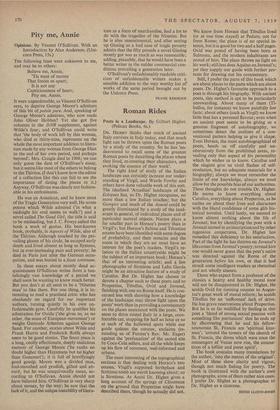Pity me, Annie
THE following lines were unknown to me, and may be to others:
Believe me, Annie, 'Tis want of money That forces us apart; It is not any Capriciousness of heart; Pity me, Annie.
It were unpardonable, as Vincent O'Sullivan says, to deprive George Moore's admirers of this bit of poesie pure. And, speaking of George Moore's admirers, who now reads John Oliver Hobbes? Yet she got five columns in the DNB supplement, against Wilde's four; and O'Sullivan could write that 'the body of work left by this woman, who died at thirty-nine, represents on the whole the most important addition to litera- ture made by any woman from George Eliot to the end of her own period, and perhaps beyond'. Mrs. Craigie died in 1906; we can only guess the date of O'Sullivan's essay, but it seems like most of the others to belong to the Thirties. (I don't know how the editor of a collection like this can fail to see the importance of dating the pieces in it.) Anyway, O'Sullivan was clearly not fashion- able in his enthusiasms.
He was an American, and he knew most of the Tragic Generation very well. He wrote poems which Wilde admired ('in what a midnight his soul seems to walk I') and a novel called The Good Girl; the title is said to be misleading, but J. C. Powys called the book a work of genius. His best-known book, probably, is Aspects of Wilde, also of the Thirties. Although touched by the pre- vailing gloom of his circle, he escaped early death and lived almost as long as Symons, but in ever-increasing pain and poverty; he died in Paris just after the German occu- pation, and was buried in a fosse commune.
In these essays about mostly dead ac- quaintances O'Sullivan writes from a tan- talisingly vast knowledge of a period we shall soon be wanting to know much better. But you don't at all need to be a 'Nineties man' to like them. For one thing, it is in- teresting to read a practised critic who has absolutely no regard for our important authors, turning quietly in his own un-
fashionable gyre. Carefully he qualifies his admiration for Oujda ('she gives us, as no other, the sense of European movement') or weighs Gertrude Atherton against George Sand. For another, stories about Wilde and Frank Harris and Frederick Rolfe always seem to be good stories. The finest piece is a long, coolly affectionate, deeply malicious memoir of George Moore Ole ranks no doubt higher than Huysmans but no higher than Goncourt'); it is full of horrifyingly good gossip. Moore was a divided man, foul-mouthed and prudish, gifted and ab- surd; but he was unequivocally mean, ac- cording to O'Sullivan. Annie should not have believed him. O'Sullivan is very sharp about money, by the way; he saw that the lack of it, and the unique instability of litera- ture as a form of merchandise, had a lot to do with the tragedies of the Nineties. But he is also unsentimental, and after setting up Gissing as a bad case of tragic poverty admits that the fifty pounds a novel Gissing mostly got was as much as was reasonable; adding, plausibly, that he would have been a better writer in the milder commercial con- ditions prevailing a generation later.
O'Sullivan's unfashionably readable criti- cism of unfashionable writers makes a sensible addition to the very worthy list or works of the same period brought out by the Unicorn Press.
FRANK KERMODE


























 Previous page
Previous page